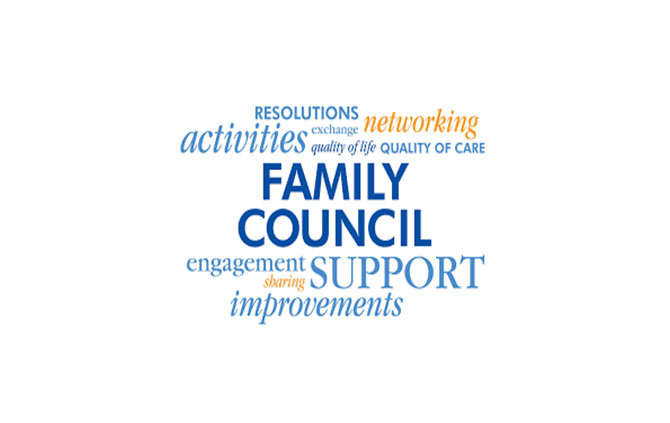Posted
Categories: My Experience, Patient Voice Mail
I’m Lisa Dawson, Chair of the Vancouver Coastal Association of Family Councils and Secretary/Treasurer on a steering committee for the Provincial Association of Family Councils (the Family Councils of BC steering committee). I’m also a Co-chair of one long-term care home council, which has been home to my dad for the past 11 years. Since our council was established, families and the home operator have enjoyed a collaborative, respectful and productive relationship. The following is an article about my experience working with family councils.
Families and those of importance to residents in long-term care (“families,” in short), are the unsung heroes of the long-term care provider team. These dedicated volunteers take on resident care tasks from feeding and hairdressing; to socialization and entertainment; to escorting to events and translating. They are invaluable to enhancing their loved ones’ quality of care and life!
How can families work with a home’s leadership to achieve the best possible experience for residents during their stay? The answer is family councils.
What’s a Family Council?
A family council is a self-led group of families and friends of importance to residents in long-term care (LTC) who:
- Work to improve the quality of care and life of the home’s residents; and
- Provide families with a voice in decision-making that affects them and their loved ones.
Family Council History Highlights
In 2009, a LTC investigation by the Family Councils of BC (FCOBC)’s Ombudsperson, highlighted the need for greater provincial support and a coordinated response to address systemic issues raised by resident and family councils. To improve the effectiveness of these councils, the Ombudsperson recommended that health ministries create an expanded role for resident and family councils in legislation and establish or develop regional family council organizations to serve as a needed early warning system for the ministries by allowing family councils to identify common, and perhaps systemic, problems.
In November 2020, the FCOBC’s seniors advocate did a province-wide survey on the impact of visitor restrictions in LTC and the results revealed that the voices of residents and family members weren’t always included in decision-making. The report recommended that the Ministry of Health (MOH) work with the FCOBC to establish a LTC Resident and Family Council Association to ensure the voices of residents and family members are equal to those who own and operate care homes and the staff who work there.
Residential Care Regulation specifies councils can be established by residents and/or their families. Additionally, the MOH provides guidelines on how councils may choose to operate, although I find that it can be difficult to enforce these guidelines. A “Proposal for Change” was sent to the MOH in 2018 by the Vancouver Island Association of Family Councils which was endorsed by numerous LTC advocates. It addresses the challenges many family councils face and recommends changes to regulatory language in the Residential Care Regulation to support licensees’ commitment to support and encourage family councils.
What Do Family Councils Do?
In my experience, there’s no limit to what a family council can and will do to help their loved ones. Here are a few examples:
- Create the opportunity for members to meet in a safe environment that gives them privacy to openly discuss and plan for ways to improve residents’ quality of life
- Offer ongoing support for one another. Strength can be drawn from mutually shared experiences
- Act on concerns affecting LTC home residents
- Collaborate and communicate with LTC leadership both in writing and in-person
- Serve as a sounding board and advisory body on new ideas and improvements
- Advocate for positive changes to improve residents’ quality of care and quality of life
- Educate families about the long-term care system to strengthen their advocacy skills
How Do Family Councils Support Quality in Long-Term Care?
Improving residents’ quality of life is the goal of family councils! Quality is an intersection of a variety of indicators ensuring residents’ dignity, choice and autonomy.
A Family Council Benefits the Home and Staff by:
- Promoting communication and collaboration with management and staff to build trusting relationships
- Identifying concerns to be addressed and resolved
How Can You Get Involved?
Get to know other families with a loved one in care to see if there’s interest in starting a family council. Or, if there’s already an existing family council, consider joining it. Reach out to the staff and administration at the long-term care home to see what their policy is on supporting the establishment of new and existing councils. Contact your Regional Association of Family Councils and request their guidance and assistance.
Get in Touch
Provincial Association of Family Councils: familycouncilsofbc@gmail.com
Regional Associations of Family Councils
Vancouver Island Association of Family Councils: vifamilycouncils@gmail.com
Vancouver Coastal Association of Family Councils: vcafc.regional@gmail.com
Fraser Association of Family Councils: FAFC2021alicea@gmail.com
Interior Association of Family Councils: interiorfamilycouncils@gmail.com
Northern Association of Family Councils: nelsonmord@gmail.com
Some content has been used with permission from the Vancouver Coastal Association of Family Councils (VCAFC).
Author: Lisa Dawson, Chair of the Vancouver Coastal Association of Family Councils and Secretary/Treasurer on a steering committee for the Provincial Association of Family Councils


